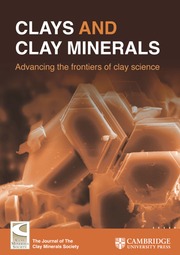Article contents
Reactions of Zinc with Acid and Base Saturated Dickites
Published online by Cambridge University Press: 01 July 2024
Abstract
The effect of pH, time and temperature on the interaction of zinc with acid and base saturated dickites has been investigated. Increase in pH resulted in an increase in adsorption of zinc in the higher concentration range. The adsorption increased rapidly and then slowly with increase in the time of interaction. The variation of rate constants and the half times of reaction suggested an exchange process controlled by film and possibly particle diffusion and thereafter fixation processes. The inferences found support from the nature of adsorption isotherms. Temperature affected adsorption with exothermic interactions. The activation energy of adsorption of zinc on Na-dickite was 14.0 kcal mole−1.
Резюме
Изучалось влияние рН,времени и температуры на взаимодействие цинка с диккитом,насыщенным кислотой и основанием. При увеличении рН увеличивалась адсорбция цинка при более высокой степени концентрации. Адсорбция сначала быстро увеличивалась и затем медленнее с увеличением времени взаимодействия. По изменению постоянных скорости и половины времени реакции можно предположить,что процесс обмена контролировался диффузией пленки и возможно частиц и затем процессами фиксации. Эти выводы были подкреплены характером изотерм адсорбции. Воздействие температуры на адсорбцию указывает на экзотермический характер взаимодействий. Активационная энергия адсорбции цинка Na-диккитом была 14,0 KCal мол−1.
Kurzreferat
Der Effekt von pH,Zeit und Temperatur auf die Einwirkung von Zink auf mit Säuren und Basen gesättigten Dickiten wurde investigiert. Eine Erhöhung in pH resultierte in einer Erhöhung in Adsorption von Zink in der höheren Konzentrationsgruppe. Die Adsorption nimmt zuerst schnell zu und dann langsamer mit zunehmender Zeit der Einwirkung. Die Variation der Geschwindigkeitskonstanten und Halbwertszeiten der Reaktionen schlägt eine Austauschprozedur vor,die durch Film-und vielleicht Teilchendiffusion und danach durch eine Bindung kontrolliert wird. Die Folgerungen wurden durch die Natur der Adsorptionisothermen unterstützt. Die Temperatur übte einen Einfluß auf die Adsorption aus-mit exothermischer Wirkung. Die Aktivitäts-energie der Adsorption des Zinks auf Na-Dickit war 14,0 kcal mole−1.
Résumé
L'effet de la température, du pH,et du temps sur l'interaction du zinc avec des dickites saturées d'acide et de base a été investiguée. L'augmentation du pH a résulté en une augmentation de l'adsorption de zinc dans le domaine de haute concentration. L'adsorption a augmenté rapidement et puis lentement avec l'augmentation du temps d'interaction. La variation du taux d’échange et des demi-vies de réaction a suggéré un processus d’échange contrôlé par la diffusion de film et possiblement de particule, et par la suite, de processus de fixation. Ces déductions ont été appuyées par la nature des isothermes d'adsorption. La température a affecté l'adsorption dans les interactions exothermiques. L’énergie d'activation d'adsorption du zinc sur la Na-dickite était 14.0 Kcal mole−1.
Keywords
Information
- Type
- Research Article
- Information
- Copyright
- Copyright © 1978, The Clay Minerals Society
References
- 2
- Cited by

